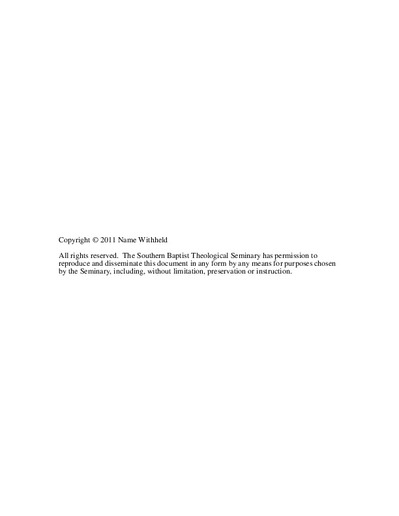| dc.description.abstract | Marketplace Ministries, specifically BAM and tentmaking, can be used in North Africa to effectively share the gospel in culturally impacting ways. Chapter 1 introduces the concept of BAM by presenting various definitions of BAM and finding a desirable definition for the purpose of this study. After finding a satisfactory definition for BAM, marketplace ministries are discussed and a suitable framework is developed for the use of tentmakers. The chapter reviews the relevant literature related to the practices and ministries of BAM and tentmaking.
Chapter 2 examines the biblical and historical basis of BAM and tentmaking as effective strategies for reaching the lost. Old Testament principles are established for the use of marketplace ministries and the lives and work of Paul, Priscilla, and Aquila are examined as examples of those who used business to carry out ministry. Lastly, some historical flashpoints of missionaries and missionary enterprises that used business to carry out their missionary task are given.
Chapter 3 examines some of the contemporary issues related to the practice of BAM and tentmaking especially as it relates to a mission structure such as the IMB. I give three criteria for tentmakers that must be exhibited to be effective; identity, integrity, and intentionality. Patrick Lai's continuum for tentmakers is discussed and evaluated based on those criteria.
Chapter 4 delves specifically into tentmaking and the role of the IMB from Richmond to North Africa. Interviews were conducted with key leaders in Richmond VA, London, England, and North Africa. A survey was developed, distributed, and evaluated among missionaries in North Africa with the IMB. The survey is delimited to IMB personnel with the dual purpose of establishing a baseline for how tentmaking can be used in organizational structures and to see what needs IMB personnel are experiencing as they work on the field. Questions are answered that were raised as a result of practitioners dealing honestly with identity, integrity, and intentionality on the field. Chapter 5 examines the paradigm shifts necessary to make BAM and tentmaking viable in today's world of CAN/RANs. Discussion centers in the areas of missionary selection, education, training, and the funding of tentmakers and their platforms. For tentmaking to be effective in nations hostile to the gospel, shifts will have to be made in the areas of supervision, policy, and strategy. | en_US |

